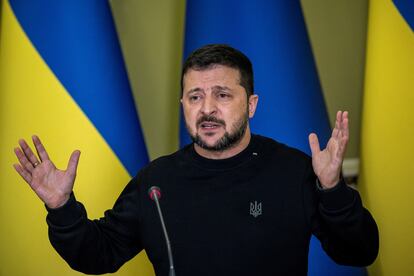Zelenskiy warns Trump that his electoral promise to end the war in Ukraine is unviable
The former president claimed he could strike an agreement to end the conflict in ‘24 hours,’ but the Ukrainian president says that peace is not possible because of Putin

Donald Trump’s relationship with Ukraine has been stormy. The former president’s first impeachment occurred in 2019, when a U.S. Congressional investigation concluded that the Trump administration blackmailed Ukrainian authorities by threatening to block military aid to the country if they did not open an investigation into Joe Biden and his son, Hunter, over alleged corruption. Trump has always been on friendly terms with the Russian autocrat Vladimir Putin. The Kremlin was also behind a massive smear campaign that hurt Hillary Clinton’s presidential campaign in the 2016 race against Trump.
Now, Trump, who is leading the polls to win the 2024 presidential election, has been claiming that, if he were elected, he would end the war “in 24 hours.” Ukrainian President Volodymyr Zelenskiy responded to this claim for the first time on Sunday: “I will need 24 minutes, yes 24 minutes to explain to president Trump that he can’t manage this war. He can’t bring peace because of Putin.”
Zelenskiy is concerned about the drift of the Republican Party, which blocked aid to the country in September. Last month, the Republicans prioritized funding for Israel’s offensive against Hamas, and once again blocked President Joe Biden’s plan to provide $60 billion in assistance in Ukraine. While many in the party support Kyiv, many believe supporting the country has become unsustainable.
“American taxpayers have become weary of funding a never-ending stalemate in Ukraine with no vision for victory,” eight Republican members of Congress wrote in a letter addressed to Biden on October 31. The Republicans argued that the White House must meet 12 conditions before Congress will consider funding for Ukraine.
“If we don’t get the aid, we will lose the war,” Zelenskiy told U.S. lawmakers in September.
But with Ukraine’s failure to advance on the front, there is increasing pressure for the conflict to come to an end. Before last year’s midterm elections, Republican lawmakers promised to cut aid to Ukraine. Ukrainian Foreign Minister Dmytro Kuleba admitted to Axios that the country was “concerned” about these promises, but said: “People make political statements before elections and pursue different policies after the elections.”
However, Republicans have kept their promise not to support funding for Ukraine. What’s more, with just one year to go until the 2024 presidential elections, the focus on Ukraine is set to intensify. Presidential hopeful Vivek Ramaswamy said in an interview on October 30 with journalist Piers Morgan that if he is elected president, he will strike an agreement to end the war that guarantees Russia control of the territories it has conquered and blocks Ukraine’s accession to NATO.
Trump also promised to reach a deal if elected president. “I know Zelenskiy very well, and I know Putin very well, even better,” he told Fox News in July. “And I had a good relationship, very good with both of them. I would tell Zelenskiy, no more. You got to make a deal. I would tell Putin, if you don’t make a deal, we’re going to give him a lot. We’re going to [give Ukraine] more than they ever got if we have to. I will have the deal done in one day.”
On Sunday, however, Zelenskiy questioned Trump’s claims “If [Trump]’s not trying and if he’s not ready to give our territory [to] this terrible man, [to] Putin, if you are not ready to give it, if you are not ready to give our independence, he can’t manage it,” he told NBC.
When asked if he thought Trump would support Ukraine if elected, he replied: “Really, I don’t know.” “I hope that it depends not only on the president institutionally. I think it depends on the opinion of Americans, of your society. I think that is most important,” he added.
However, public opinion is also turning against Ukraine. According to a Gallup poll conducted on November 2, 41% of Americans believe that their government “does too much” for Ukraine; up from 29% in June and 28% in January.
Sign up for our weekly newsletter to get more English-language news coverage from EL PAÍS USA Edition
Tu suscripción se está usando en otro dispositivo
¿Quieres añadir otro usuario a tu suscripción?
Si continúas leyendo en este dispositivo, no se podrá leer en el otro.
FlechaTu suscripción se está usando en otro dispositivo y solo puedes acceder a EL PAÍS desde un dispositivo a la vez.
Si quieres compartir tu cuenta, cambia tu suscripción a la modalidad Premium, así podrás añadir otro usuario. Cada uno accederá con su propia cuenta de email, lo que os permitirá personalizar vuestra experiencia en EL PAÍS.
¿Tienes una suscripción de empresa? Accede aquí para contratar más cuentas.
En el caso de no saber quién está usando tu cuenta, te recomendamos cambiar tu contraseña aquí.
Si decides continuar compartiendo tu cuenta, este mensaje se mostrará en tu dispositivo y en el de la otra persona que está usando tu cuenta de forma indefinida, afectando a tu experiencia de lectura. Puedes consultar aquí los términos y condiciones de la suscripción digital.









































